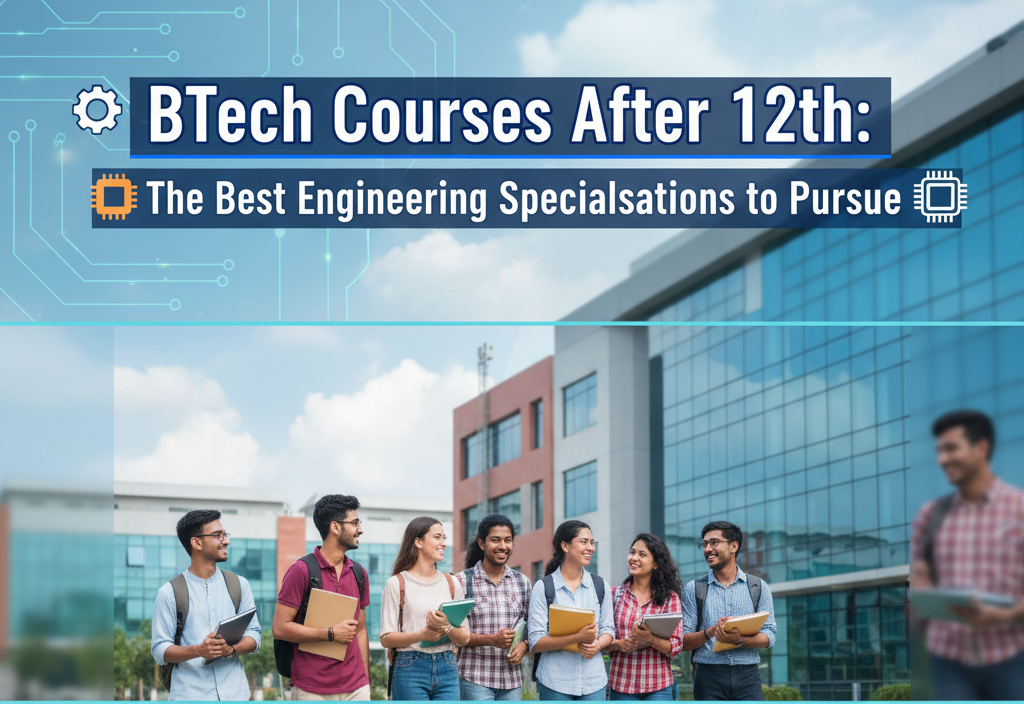
Completing 12th grade is a major milestone; it is a period of excitement, curiosity, and, of course, some confusion as well. Engineering is one of the most popular career choices for science students, with many career opportunities ahead. B.Tech courses after 12th are among the many paths that can lead to both traditional and modern career opportunities. Whether it is a more traditional, yet still reliable branch such as Computer Science and Mechanical Engineering, or a more futuristic one, such as Artificial Intelligence and Cybersecurity, the options are endless. The article is a comprehensive guide that will take you through the best B. Tech courses after 12th, tell you what makes them special, their career prospects and assist you in selecting a course specialisation that best suits your abilities and interests. Be it building a skyscraper, creating an intelligent machine, or digital protection, you will find this guide to help you build a successful career in engineering with B.Tech.
Top B.Tech Courses After 12th for Aspiring Engineers
When students consider the best course from the list of available B. tech courses after 12th standard, the first names that come to mind are the traditional and emerging branches of engineering. These courses are the ones that have continued to produce industry leaders and are still in demand.
Computer Science Engineering (CSE)
Computer science engineering is one of the most demanded study areas in engineering, which specialises in computing systems, programming, and algorithms. The students learn topics such as Data Structures, Operating Systems, and Artificial Intelligence, giving them a good understanding of software and technology development.
Career Scope: Graduates have the prospect of becoming a Software Developer, Data Analyst, System Architect, or IT Consultant in IT firms, startups, and multinational corporations.
Information Technology (IT)
IT focuses more on computer systems, networks, and database management, along with an equal focus on software development. Classes in Networking, Database Management System, and Web Development enable students to develop good problem-solving and technical skills.
Career Scope: IT engineers can find roles as Network Specialists, Cloud Architects, or IT Consultants in the field of digital infrastructure, cloud services, and information systems.
Mechanical Engineering
Mechanical Engineering is the oldest branch of engineering, which is associated with machines, engines, and design. Students are introduced to fundamental subjects such as Thermodynamics, Mechanics and Machine Design, which enable them to develop, test, and invent physical systems.
Career scope: Career opportunities can be as a Mechanical Engineer, Automotive Engineer, and Aerospace Engineer in manufacturing, auto manufacturing, and defence sectors.
Civil Engineering
Civil Engineering is all about the design and development of infrastructural projects. Students acquire skills in areas such as Structural Engineering, Surveying, and Construction Management, and learn how to construct safe and durable buildings.
Electrical Engineering
This branch is related to the generation of power, electric systems, and control mechanisms. Students learn about Circuits, Power Electronics, and Control Systems, which they later apply to real-world issues on power distribution and energy innovations.
Career Scope: Power Plant Engineers, Electrical System Designers and Renewable Energy Specialists are some of the opportunities for Electrical Engineers.
Electronics & Communication Engineering (ECE)
ECE serves as a bridge between electronics and communication, and graduates specialise in circuits, communication, and embedded technologies. Students learn about Digital Electronics, Communication Systems, and Microprocessors that can enable them to become innovators in telecommunication and digital systems.
Career Scope: Some of the popular roles are Communication Engineer, Embedded systems Designer, and VLSI Engineer in the telecom industries, electronics, and R&D sectors.
The Best B.Tech Courses After 12th (Emerging and High-Demand Specialisations)
Besides traditional disciplines, the new age requires professionals skilled enough in the latest and emerging engineering disciplines. These are some of the best B. Tech courses after 12th since they align with the global trend.
Artificial Intelligence & Machine Learning
AI & ML are the core of future tech, based on neural networks, algorithms, and models of machine learning. The concepts that students learn are Deep Learning, Natural Language Processing, and Predictive Analytics in order to develop intelligent systems.
Data Science & Analytics
The branch trains students to work with enormous sets of data, processing, and analysing it. Subjects in Statistics, Big Data Tools, and Machine Learning will assist them in making strategic business decisions by interpreting information.
Career Scope: Careers are as a Data Analyst, Business Intelligence Engineer, or Big Data Engineer, particularly in IT, banks, and consulting firms.
Cybersecurity
As cyber threats increase, the Cybersecurity branch prepares the students with skills in network defence, encryption, and white-hat hacking. Its major topics are Cryptography, Cyber Laws, and Network Security.
Career Scope: Graduates can work as Cybersecurity Analysts, Ethical hackers, or Security consultants in IT security companies, banks, and defence agencies.
Robotics & Mechatronics
This is an interdisciplinary field that combines the branches of mechanical, electrical, and software engineering to create intelligent machines. Subjects like Automation Systems, Embedded Systems, and Control Engineering equip students to make sophisticated robotics systems.
Career Scope: Mechatronics Engineers, Robotics Engineers, and Automation Specialists work in fields such as healthcare, manufacturing, and defence.
Biotechnology
Biotechnology is a combination of biology and engineering applications, which is related to genetics, bioprocessing, and medical developments. Students are exposed to training in Molecular Biology, Bioprocess Technology, and Bioinformatics to produce healthcare and agriculture solutions.
Career Scope: Biomedical Researchers, Genetic Engineers, and Biotechnologists are in demand in the pharmaceutical, farming, and medical research fields.
How to Choose the Right B.Tech Course After 12th?
There are numerous top B.Tech courses after 12th, and it is often confusing as to which course to take. The following factors will assist you in determining which course is suitable for you.
Your Interests
Consider what interests you, whether it is coding, designing, working on building machines, or having new ideas. Following your passion will keep you motivated throughout the program duration.
Future Scope
Keep track of the evolution of jobs across industries. Branches like AI, Data Science, and Cybersecurity are in boom while traditional branches like Mechanical and Civil still have good demand.
Salary Potential
Branches like CSE, AI, and Data Analytics are usually accompanied by lucrative pay packages. However, don't forget that your growth depends on your skills and consistency.
Learning Style
Certain courses include more computer programming and digital lab work, whereas some are more practice-oriented, involving hands-on projects. Select the one that suits you in the way you love learning.
College Reputation
A branch is important, but the college you choose is also very important. A well-known institute, with good faculty, placements, and industry tie-ups, can influence the career path.
Global Opportunities
In case you want to study or work abroad, you need to verify the B.Tech specialisations that are more recognised internationally.
Long-Term Goals
Consider whether the course has the capacity to help you in your future plans, such as taking up an MBA, M.Tech, or even starting your own company.
Top B.Tech Courses by Scope and Salary
The following table provides the list of the top B.Tech courses after 12th in terms of average starting salary and industries that usually hire graduates.
Course |
Average Starting Salary (per annum) |
Key Industries |
|---|---|---|
| Computer Science Engineering (CSE) | ₹6-₹12 LPA | IT, Software, Startups |
| Information Technology (IT) | ₹5-₹10 LPA | Networking, Cloud, IT Firms |
| Mechanical Engineering | ₹4-₹8 LPA | Manufacturing, Automotive, Aerospace |
| Civil Engineering | ₹4-₹7 LPA | Construction, Real Estate, Infrastructure |
| Electrical Engineering | ₹5-₹9 LPA | Energy, Power, Electronics |
| Electronics & Communication Engineering (ECE) | ₹5-₹9 LPA | Telecom, Embedded Systems, R&D |
| Artificial Intelligence & Machine Learning | ₹8-₹15 LPA | Tech Giants, Startups, R&D |
| Data Science & Analytics | ₹7-14 LPA | IT, Finance, Healthcare |
| Cybersecurity | ₹7-₹12 LPA | IT Security, Banking, Defense |
| Robotics & Mechatronics | ₹6-₹11 LPA | Manufacturing, Defense, Healthcare |
| Biotechnology | ₹5-₹9 LPA | Pharma, Agriculture, Healthcare |
| Agriculture Engineering | ₹2.5 - ₹7 LPA | Agri-tech startups, Government sectors, Food processing, Irrigation & water management |
Conclusion
Choosing from the numerous B.Tech courses after 12th does not only involve following the trend or good salary, but it is also about knowing your passion, your capabilities, and your long-term goals. The traditional disciplines, such as Computer Science, Mechanical, Civil, and Electronics, are still robust and new fields such as AI, Data science, Cybersecurity, and robotics are redefining the future. Whichever direction you choose to follow, it is important to remember that success is achieved through commitment and never-ending learning. A career in engineering with B.Tech is based on innovation and growth, and filled with lifelong opportunities.
FAQs


